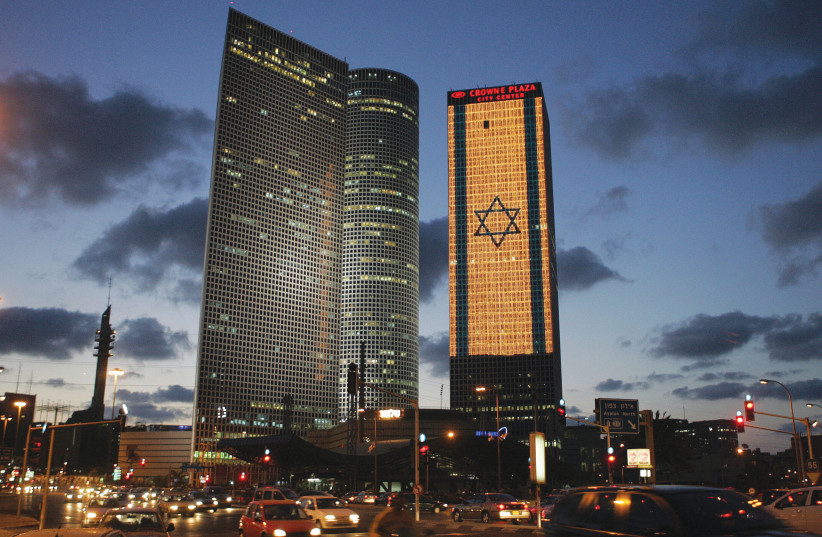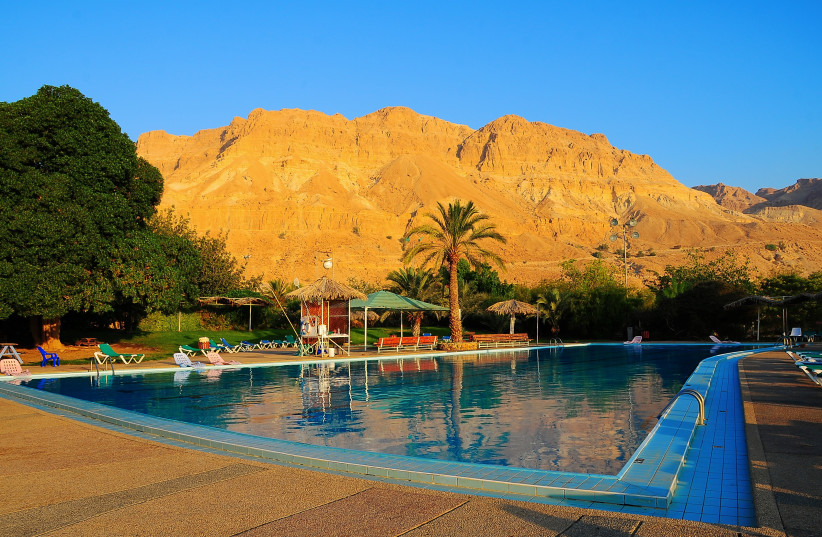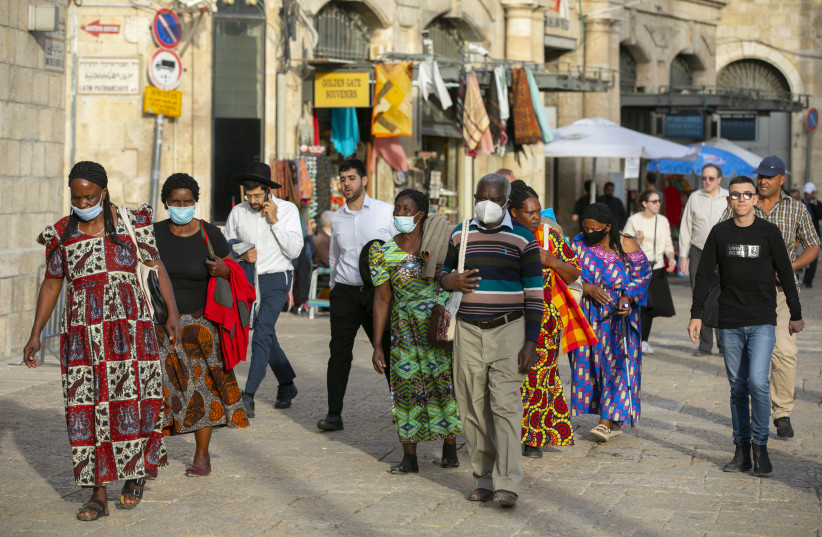Though the pandemic is certainly not over, mass vaccination campaigns have allowed people to return to doing one of the things they love most: Travel.
The tourism industry took a hard hit everywhere. In Israel, thousands lost their jobs and an entire sector was out of business, leading to protests for greater government protection and financial guarantees. Tour guides, out of options, patience and funds, marched in August from Caesarea to Jerusalem in protest.
April is always a popular travel month, bringing in thousands of visitors yearly. The Magazine spoke to hotels, municipalities and industry insiders to understand what they are feeling, what they are expecting and what the next few weeks are going to look like.
<br>The state of tourism
The Tourism Ministry said it estimates that around 30,000 tourists will arrive in Israel for the big three holidays: Passover, Easter and Ramadan. In March alone, 170,000 tourists landed here.
The city of Tel Aviv-Jaffa said it claimed 75% of the inbound March tourists: “We expect numbers to keep growing,” said Yael Froman-Ideses, director of tourism at Tel Aviv Global and Tourism.

Jerusalem is expecting tourists numbering in the hundreds of thousands, Deputy Mayor Fleur Hassan-Nahoum predicted.
Israel recently – gradually – opened up to tourists, and this can be felt in various tourist, religious and cultural sites all across the country.
<br>Hotels and COVID
In 2019, a whopping 4.55 million tourists visited Israel, breaking records and contributing more than $2 billion to the economy, per the Tourism Ministry.
When Ein Gedi Hotel shuttered in March 2020, that was the first time the hotel had been closed since its opening 60 years ago, a spokesperson for the hotel told the Magazine.
The hotel is located right at the seam line between the Dead Sea and the Judean Desert, offering an opportunity to access these unique and different locations.
“The challenge for us during the pandemic and the closures was pivoting from a hotel that targeted – and attracted – more of a foreign tourist audience, to one of internal tourism, Israelis,” hotel spokesperson Merav Eilon said.
But, thanks to the hotel’s wide-open spaces, access to nature and being located on top of the Ein Gedi nature reserve, they were able to adapt well to the social-distancing challenges that the coronavirus posed.
Founded in 1953, Kibbutz Ein Gedi was established on the site of the biblical city, and remained isolated from Jerusalem until 1967, when a direct road was paved between Jerusalem and the shore of the Dead Sea through Jericho.
The hotel and the kibbutz are all part of the Ein Gedi nature reserve, which includes valleys and two main rivers, not to mention its plethora of birds, plants and wild animals. It is in this environment in which the hotel is set up. Visitors might even run into Nubian ibex – known in Hebrew as “ye’elim” – on the hotel grounds, as it is located within their natural habitat.

“During the closures, it was almost as if someone was telling us ‘Forget everything you thought you knew and did up until now. Scrap all that, and [redo], from the beginning, every detail of the experience that your guest has here.’ This call for creativity brought us so much,” said Tom Geva, the hotel’s CEO.
In Jerusalem, the mid-price Hotel Yehuda, located in the Masua Hills, is expecting 380 people for the first night of Passover, and 1,200 guests throughout the whole holiday. The upscale David Citadel is anticipating a full return to pre-pandemic numbers by 2023.
Hotel Yehuda, like most other hotels, was forced to close over the last two years. “It was sad. People wanted to come, but the hotel staff was unable to,” a hotel spokesperson said.
“The first quarter of 2022 was difficult,” said Maurits Van Den Berg, general manager at the King Solomon Hotel Jerusalem. “Omicron really came out of left field and blocked the reemergence of tourist travel.”

Surviving and thriving during a pandemic
Everyone the Magazine spoke to referenced “living alongside the coronavirus.”
“The hotel industry is a challenging one,” said the Hotel Yehuda spokesperson. “So anyone who steps into it knows it’s extremely unique and is constantly surprising us. We believe that we will learn to live alongside the coronavirus, and that this upcoming summer will be even more successful than the last.
“No variant, no matter how bad, can break out in a single week, so we are fairly confident the week of Passover will come and go smoothly... The current trend is actually to carry on despite [COVID,] with the understanding that life goes on.”
In Tel Aviv-Jaffa, things are carrying on as usual, and tourists even started streaming back to Safed in January, resident Menachem Mendel Engel said. The art gallery Engel works at was closed for two years.
“It was very quiet the last two years,” he said. When the pandemic started, “it was very intense here... not a soul in the streets, and Safed depends heavily on tourism.”
And with the return of tourists, now, “the atmosphere is great,” Engel said.
Jerusalem is offering – thanks to funds dedicated to that purpose – a plethora of cultural activities this year, and actually took advantage of the relative lack of foot and road traffic throughout the city to do some much-needed construction to main roads and landmarks. Just look at the recently renovated Paris Square. “While the world stopped, we moved forward in other ways,” said Hassan-Nahoum.
“We did this so that, when restrictions would eventually lighten and people could [actually] experience [the city], it would be a pleasant one,” she added.
Like the rest of the economy, Ein Gedi got used to living alongside the coronavirus. This ranges anywhere from unexpected – yet understandable – cancellations to constantly changing health regulations and policies.
Mainly, said Eilon, it’s about knowing the virus is here to stay. Everyone – the hotel guests and the hotel staff – know perfectly well what it means to be part of a hotel experience under COVID.
“Mostly, what changed,” said CEO Geva, “is the level of flexibility we’ve developed and the ability to adapt to swift changes in room capacity, whether that is last-minute cancellations or room orders at the last minute.”
“There’s been a strong uptick in tourism to Israel this year. Primarily from the United States, Europe, South America and Korea. Other previous developing markets, however, are still not really materializing. The Chinese, Indian and Nigerian markets remain weak,” said Van Den Berg.
The Tourism Ministry noted that even throughout the concerns of the last two years, people continued to travel.
For Hotel Yehuda, as soon as the skies opened back up, that restored the option for so many people to come visit, including Birthright groups and families who have been waiting to come here for so long.
“The connection with Diaspora Jewry is so important, to Diaspora Jews and to Israelis alike who are thirsting for a relationship with Jews worldwide.”
<br>How will this season be different?
Though nearly all of the places and people the Magazine spoke to seemed excited by the return of normal tourist life, not everybody is.
“There’s nothing to look forward to about spending Passover in Israel, other than enjoying the prospect of being price-gouged by restaurants and businesses even more than usual. It’s the season of exploitation for those freyerim [suckers] who didn’t manage to get out of Israel,” lamented Daniel, a Jerusalem resident.
The Ein Gedi Hotel saw a return to its pre-pandemic reservation numbers already in the spring and summer of 2021. As of press time, there are few rooms left to book, with 35% of them filled with tourists. A happy trend.
“You don’t need more than a good book, earbuds and something to drink to pass along an immensely enjoyable day here,” countered Eilon. “Ein Gedi forces its guests to think a little differently about what vacation is and can be: Less of a chase after attractions and more of a deep rest – it’s the art of doing nothing. It’s not about doing anything, it’s about existing, something that is so hard for Israelis to do.
“People come here because they want to hear how the kibbutz [Ein Gedi] was built, to meet the people who live here, to get to know the local artists. The cultural experiences that we offer are free – including trips, shows, workshops and meet-ups that are oriented around the people that actually live here. It’s an amazing thing that weaves connections together that you can’t get anywhere else,” said Eilon.
The David Citadel will maintain its “strong focus on the US market and continue to work intensively with travel agents,” a spokesperson for the hotel said. This extends as well to individuals traveling for personal celebrations.
Tel Aviv has “developed attractions in open public spaces” with “tourist information centers set up with updated information regarding Israel’s COVID guidelines,” guidelines that all cultural centers and tourist spots adopt and follow.
“The city has adapted, to ensure the health of all visitors while still being able to showcase all we have to offer,” said Froman-Ideses, of Tel Aviv Global and Tourism.
The Jerusalem Municipality has allocated a significant amount of city budget funds to Ramadan-related activities.
“I am delighted that after a difficult few years, things are returning to normal,” said Jerusalem resident Alex Winston.
The King Solomon “want[s] to bring the city inside the hotel and deliver bespoke connectedness to our guests. We’ll be shaped by art and wellness, well-being and balance.”
The King Solomon has undergone renovation and completely redid its guest rooms, entryway and lobby, as well as the top deck and lobby terrace, ballroom and garden. And, look out for the new restaurant on its premises, Ompalos. The expected reopening date is the end of the calendar year.
What about the current wave of terrorism? People are nervous.
“Security forces in Jerusalem are very vigilant” and there is surveillance all over the city, Hassan-Nahoum said, adding that the municipality meets once a month with local Jerusalem Arab leaders to provide them with anything they need.
“Hospitality in Israel is always impacted by the political and military conflicts that surround the area. While this has a lessening effect, it still is a major factor,” said Van Den Berg.
“I believe there’s always a chance of violence and that’s a risk one takes here,” said Jerusalem resident Jill Batya.
But, she said, “it’s so nice to see Jerusalem come alive again in a way only it can with people from all around the world.”
<br>Eyes toward the Gulf
Hassan-Nahoum divided tourist groups into three: Jewish, Christian and Muslim. She said she expects a certain subgroup to crop up in the future: Muslim Arabs from the Gulf.
Since the Abraham Accords were signed in September 2020, normalization has kicked in – in more ways than one: from diplomatic and security ties to cultural collaborations and a booming tourism drive. The Tourism Ministry recently said it has set an initial target of hosting 100,000 Emirati visitors annually.
Most recently seen at the Negev Summit – which brought together the foreign ministers of Israel, Bahrain, the UAE, Morocco, Egypt and the US – the ties born out of the accords magnified Israel’s role in the region.
Within a year of the accords being signed, a direct flight was inaugurated from Tel Aviv to Bahrain, and residents of both countries were quick to get their tickets. More than 200,000 Israelis have been to the UAE and there has been around $1.5 million in trade between the accords signatories and Israel.
The progress achieved in under two years is enormous and is set to only grow in the years to come.
Hassan-Nahoum affirmed: “I think we’re going to see a new era of Gulf Muslim tourists coming to Jerusalem.” ■
